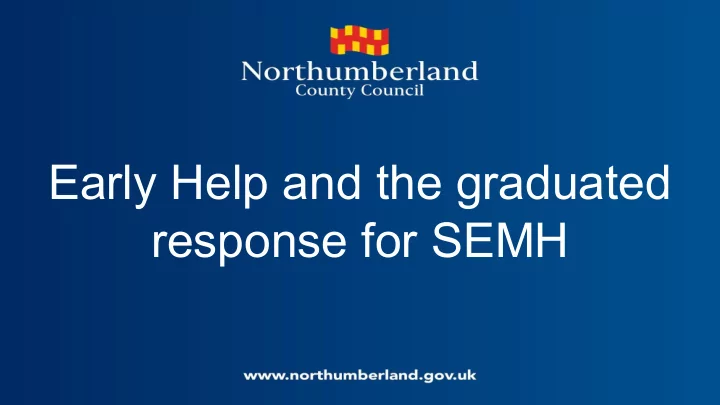

Early Help and the graduated response for SEMH
Social, Emotional and Mental Health We are clear on the need for positive SEMH in order to learn Significant evidence on what can impact on children developing positive SEHM The role schools play What else is out there
The importance of good SEMH for learning Early Intervention Foundation Research shows that social and emotional skills play crucial role in learning: Self Awareness Self Regulation Social Awareness Responsible Decision Making Relationship Skills Important for children's health, wellbeing and future success, including their educational attainment
What we know schools are already doing Universal classroom based interventions Whole school interventions Pastoral staff Targeted interventions for identified children usually through small group work eg nurture groups Employing own counsellors And all the rest!
What does research tell us impacts on children's good SEMH? Adverse Childhood Experiences (ACES) 1001 critical days https://www.1001criticaldays.co.uk/ Interparental conflict Poverty
What are the wider systems in Northumberland doing to address what we know? ACES: Early Help Workforce Offer Trauma informed practice in Adolescent Services Early Help Assessments Developing use of Signs of Safety which builds on families’ strengths Early Help Family Work teams support more complicated range of needs through Early Help Assessment process
1001 critical days : Health Visiting Partnership Plus Perinatal midwife Specialist midwifery support for substance misuse Childrens Centre Intervention and Prevention Pathway Early Year Inclusion Toolkit Early Years Passport
Interparental Conflict: New Department of Work and Pensions (DWP) services Operations Encompass Poverty: Troubled families workers, parenting drop ins, public health initiatives, children centres targeting priority areas Citizens Advice Bureau (CAB) Christians Against Poverty (CAP)
Early Help Assessments Keeping children safe in education 2018 “If early help is appropriate, the designated safeguarding lead (or deputy) will generally lead on liaising with other agencies and setting up an inter-agency assessment as appropriate” 2019 in Northumberland 558 children have had an Early Help Assessment initiated. 102 of these were initiated by schools. However we know schools lead on many “stepped down” EHAs
Northumberlands Locality Hubs - Early Help Coordinators and EH Coordination workers - Main Hub - Emotional Wellbeing Triage meeting In 2019 there have been 2229 Hub referrals
Emotional Wellbeing Triage 2019 (641) Referrer Outcomes 282 from GPs 250 to School Health 175 from schools 98 to Schools 65 to Primary Mental Health Team 26 to CYPS Emotional Wellbeing Hub 75% of cases discussed were referred to additional support
Going forward……. We need to make sure we have the right information to make decisions When GPs refer we need to look at how we understand schools views We need to explain what we need from schools in order to make informed decisions We need to give clear feedback on decisions
Conclusion Clear about the importance of the agenda Have a good Early Help offer in Northumberland Early Help strategy and overall Early Help Offer supports graduated response Multi agency commitment to Early Help from universal to more complex Developing ways to measure the impact better Early Help means not just thinking about this generation of children but their children and grandchildren
Recommend
More recommend